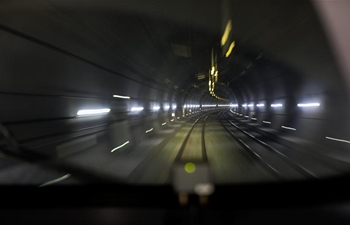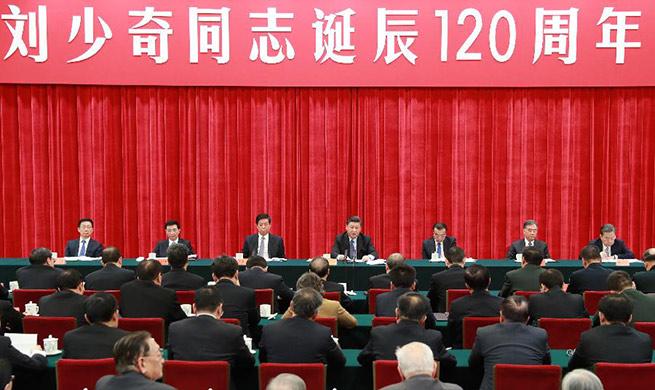by Xinhua writer Yao Yuan
SHENZHEN, Nov. 25 (Xinhua) -- What will happen if China sends high-speed trains the size of a leviathan to travel along the Belt and Road routes? Will it lead to the rise of previously lackluster inland cities?
This was a question that intrigued much interest at a forum of Chinese sci-fi writers. Surreal as it may sound, Jules Verne actually envisioned a railway running from Europe to China in his novel Claudius Bombarnac back in 1893, an idea now turned into reality.
The bold idea of employing colossal trains on the modern version of the Silk Road might be inspired by China's rapid development in high-speed railway. In just a decade, China has built 25,000 km of high-speed railway, accounting for over 60 percent of the world's total.
Like high-speed rail, other keywords of China's ongoing tech boom, like space exploration, AI and internet technologies are also topics being explored by Chinese sci-fi writers. Hugo Award winner Hao Jingfang in her 2017 story "Where Are You" discusses how cloud computing and big data may be used to keep afloat or destroy a Chinese marriage in the future.
Such notions also figured prominently in the discussions of the China Science Fiction Conference, which on Sunday entered its third and final day in the southern tech hub of Shenzhen, Guangdong Province, which hosted China High-tech Fair, a showcase of China's cutting-edge technologies, just days ago.
"Sci-fi writers are paying a lot of attention to China's technological development, especially its impact on the world," said Chinese sci-fi writer Chen Qiufan.
"For instance, China plans to build a space station and is ambitious about exploring outer space. So the world is asking: what does outer space mean to China and will the Chinese come up with their own values and ideas about the universe?" he told Xinhua.
Liu Cixin, who in 2015 became the first Chinese writer to claim a Hugo Award, sci-fi's top prize, described China as a "futuristic country in rapid changes" and thus a fertile land for sci-fi.
"Sci-fi is a barometer of a country's development. It only prospers in a country where modernization reaches a certain level," said the author of best-selling sci-fi saga "The Three-Body Problem."
According to a report issued at the opening of the conference, apart from classic themes like time travel and mind transfer, Chinese sci-fi imaginations are also being drawn to the country's current tech developments, including virtual reality and the Internet of Things.
The report points to a prospering market of sci-fi books and movies in China. In the first half of 2018, China's sci-fi industry achieved an output value of nearly 10 billion yuan (about 1.4 billion U.S. dollars), compared with a yearly total of 14 billion yuan in 2017.
LAB OF TECH-HUMAN INTERACTIONS
One source of sci-fi inspiration is China's fast-changing society remolded by new technologies, said writers attending a forum on Saturday on the localization of Cyberpunk, a Western-oriented sci-fi genre that often depicts the conflict between technologies and humans.
"Our life is being increasingly controlled by data and machines -- many people now plan their every meal and exercise based on information provided by watches and wristbands," Chen said, referring to the obsession with mobile gadgets, in China and beyond, that is pushing humans toward being cyborgs, or half-human-half-machine.
Yang Ping, a veteran Cyberpunk writer, agreed, adding that as digital gadgets become integral parts of human lives and even bodies, how to deal with large companies that monopolize such products poses an exciting question for the sci-fi sector.
The writers agreed that China is an ideal place for exploring human-tech relations. "Guangdong, Hong Kong, and Macao, in particular, are very Cyberpunk areas. The latest digital gadgets used to enter China from here, so people here used the most advanced cellphones and latest technologies while living very traditional and clan-centered lives. The contrast gives a strong Cyberpunk ambience," Chen said.
Chen is most known for his award-winning novel "The Waste Tide," a dystopian story about toilers and waste recycling monopolists in an imaginary Chinese island, whose prototype was Guangdong's Guiyu, once an e-waste disposal center notorious for pollution. Chen said he was amazed by how Guiyu's pollution was tamed in just a few years as China prioritized environmental protection.
"In China, reality often moves faster than sci-fi expectations. This 'Chinese speed' is another amazing thing for sci-fi writers," he said.
INSPIRING POWER
China's first sci-fi boom started in the early 20th century when the impoverished, war-torn country sought the help of science for national rejuvenation. The rapid industrialization in the 1950s and the reform and opening-up policy ushered in the late 1970s also kicked off two rounds of sci-fi fevers.
In recent years, China witnessed renewed public enthusiasm for sci-fi, coming at a time when the country pushes for technological innovation. Liu and Hao winning the Hugo Award also helped bring the literary genre, deemed as childish reading by many Chinese, to the mainstream discussions.
Chen Xue, a sci-fi fan attending the conference, is among the new readership that China's sci-fi has gained amid the tech boom. Nationally, there are an estimated more than 80 million Chinese sci-fi readers and fans.
"There is more news about China's science and technology, like FAST (telescope) and Mozi (quantum science satellite), in recent years, so it's natural for me to be attracted to sci-fi," said the 21-year-old engineering major. "I initially read sci-fi to understand the latest science and technologies, but it did more than that. It broadened my imaginations."
Sci-fi writer Jiang Bo, whose "Gate of Machines" won the best saga novel prize at this year's Xingyun (Nebula) Award for Global Chinese Science Fiction, said sci-fi's primary mission is not guiding the direction of science but sparking the youth's scientific enthusiasm.
"Many scientists and researchers loved reading sci-fi in their childhood, which raised their interest in exploring science," Jiang said.
Officials have also come to recognize sci-fi as a close ally of science. Chen Gang, executive secretary of the China Association for Science and Technology, said at the conference that imaginative minds are vital for China's pursuit of innovation and called for joint efforts to "energetically develop sci-fi."
The favorable wind is already blowing in the educational sector. In 2018, "The Micro-Age," a short story by Liu Cixin, made a surprising debut in the national college entrance exam. Prior to that, a number of sci-fi works were used in China's school textbooks or listed as recommended readings.
(Chen Yuxuan from Guangdong and Wang Bingyang from Beijing contributed to the story.)

















